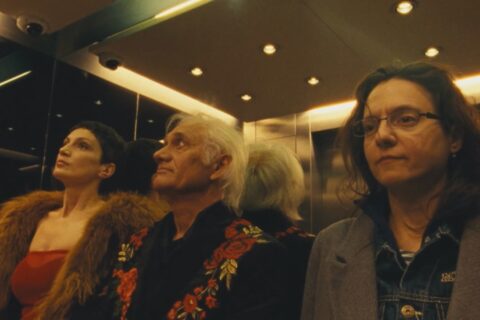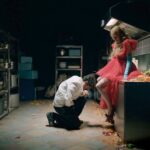Ivana Mladenović’s mordantly funny Sorella di Clausura (2025) offers a balm to the upright seriousness found elsewhere in Locarno’s main competition. In the tradition of Radu Jude (whose Dracula [2025] played last week), we have a Romanian-Serbian-Italian-Spanish co-production that eschews good taste and euro-realism in favour of flinty satire and florid melodrama.
Katia Pascariu stars as Stela, a 36-year-old woman with a difficult and ambivalent relationship to sex, work and civilised culture; simply, her face doesn’t fit. This is another powerhouse performance from Pascariu, who impressively shouldered the burden of Jude’s Golden Bear winner Bad Luck Banging or Loony Porn at the 2021 Berlinale.
As I wrote at the time, Pascariu’s character in that film, “facing a blitz of sexist reckoning as she goes about her day-to-day in Bucharest,” becomes “a figurative conduit for society’s tendency to pompous prurience.” The personal and political context is similarly forceful in Sorella di Clausura, set at the edge of the Balkans and on the cusp of the 2008 financial crisis — yet the viewer’s sympathies are rendered more complicated by Ivana Mladenović’s forthright direction and unsentimental screenplay. The mediations of modern sexuality are frankly depicted and discussed; Mladenović particularly interested in how these modes intersect with money and status amid a global economic downturn.
Stela, born into and forged by her Romany village heritage, has a long-held unrequited attraction to a famous singer called Boban (Miodrag Mladenović), who’s widely recognised as an “old fart” but with whom she’s infatuated. Boban is an absurd and idealised figure, his thinning grey hair casually coiffured, the archetype of a louche silver fox. In one startling sequence, Stela tears down a train-stop poster bearing his portrait, takes it home, lies down on his visage and masturbates with a flip-flop. This gratuitous display emblematises the wider treatment of carnal habits and erotic delinquency; mainly, that it’s a joke. The inadequate penis size of Romanian menfolk is a recurrent subject of interest, rendered both visually and in deadpan dialogue exchanges.
Split into chapters that announce themselves in wry, daubed, crimson intertitles (e.g. “Chapter One: Charlie Businessman”), the narrative follows Stela as she navigates flippant sexual encounters with different suitors while being drawn into the orbit of Vera Pop (Cendana Trifan), Boban’s rumoured mistress who encourages our protagonist to publish a memoir and support her post-boom fuck-toy start-up. Got all that? Many scenes are a comic, overblown mixture of flaccid cocks, jump cuts and stylised lighting, where the actors’ eyeballs are highlighted like slots of a letterbox. Vanja Kovačević’s spritely editing distorts the temporalities of these moments, and DP Marius Panduru has a knack for surprising sightlines and sardonic compositions.
The expertly furnished period details further augment the ironies of its late-2000s setting: Stela’s unflatteringly thin glasses, the chunky PC monitors on which she writes lovelorn missives, and the frivolous TV chat shows that feature from another world, let alone another time. When one character sincerely claims that Romania’s entry into the EU amounts to a new kind of female liberation, it is in keeping with the film’s droll attitude to the social upheavals of our recent history. Here, the turmoil of international politics and economics constitute the text, not the subtext. As another character pointedly remarks: “Come back, Ceausescu, and see how this country’s ended up. It’s in pieces.”
Joseph Owen, occasional film critic, is a research fellow at the University of Southampton.





